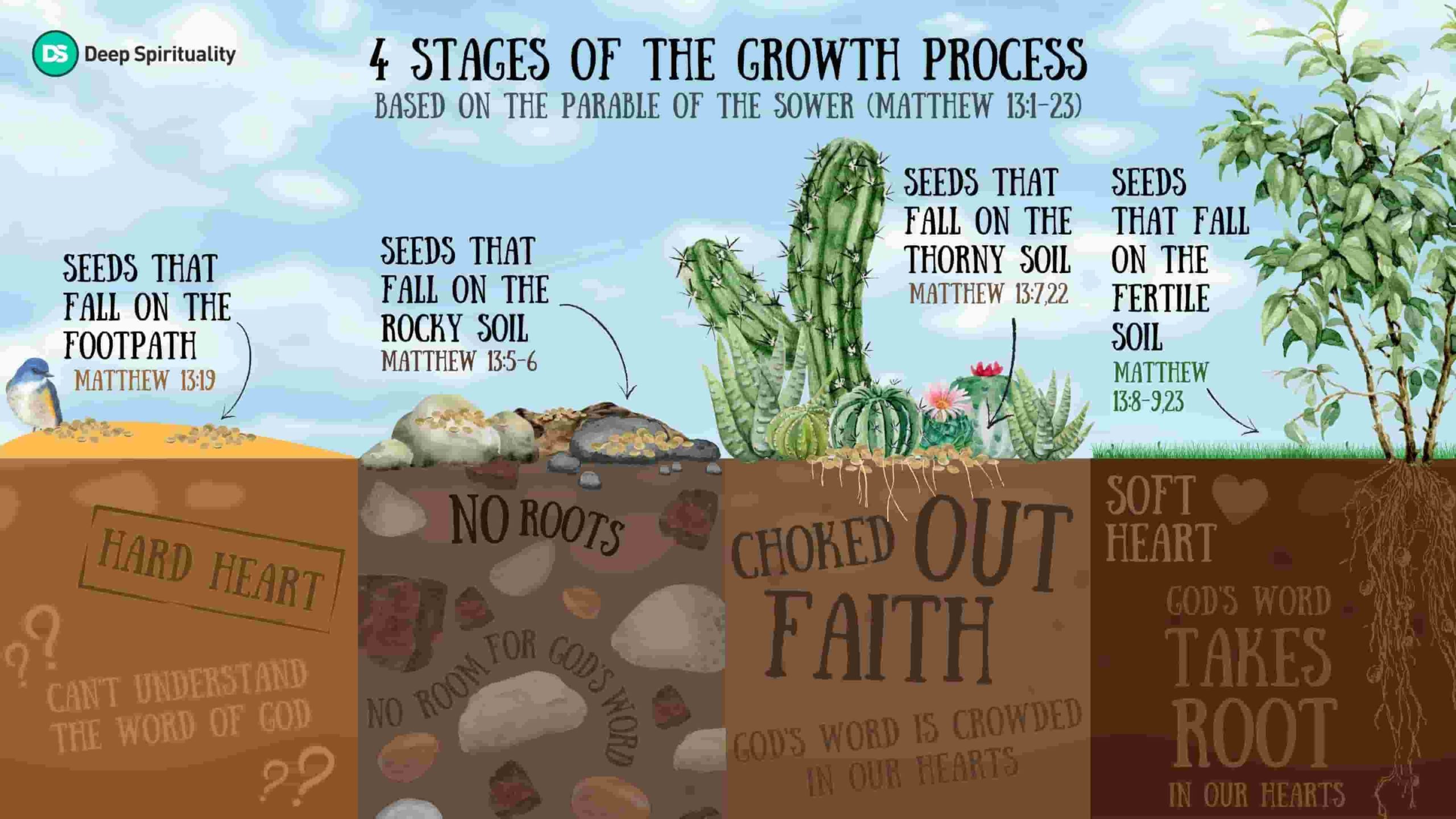Table of Contents
Note: This post is part of a series about building a personal relationship with God by reading the parables of Jesus. You can browse the entire series here.
I’ve learned a lot about myself by looking at the way I build relationships, like my relationship with my dad.
Although my dad did so much that was good for me, I didn’t always see things that way. I felt like he only talked to me to check on how my grades and preparation for exams were going so I could go to a prestigious college.
Of course, any concerned parent would check on their child’s grades, but I would overreact in anger and think he only cared about my performance.
I didn’t like how this overreaction made me feel, so I started hardening my heart and distancing myself from my dad. Although I blamed him for the distance in our relationship, the truth is that I overreacted to him because I didn’t understand myself.
I overreacted to him because I didn’t understand myself.
My dad cared about me and wanted to help me do well in life, but I couldn’t see past my own feelings. Even if my dad had done everything right, I would have felt negatively about him because of the hardened and self-focused condition of my heart. I had to accept this truth about myself before our relationship could change.
Likewise, our heart condition affects our relationship with God a lot. If we don’t understand ourselves, we will misunderstand God.
Listen to the podcast:

Follow our Deep Spirituality Podcast Network to meet all your spiritual podcasting needs. Join our Editor-in-Chief Russ Ewell and guests as they have candid discussions on spiritual topics ranging from faith to anxiety to vulnerability, or check out our narrative podcasts for an immersive storytelling experience of biblical stories. You could also listen to our scripture playlists to learn more about God and yourself as you go about your week.
Check out our book “He’s Not Who You Think He Is: Dropping Your Assumptions and Discovering God for Yourself” at https://deepspirituality.com/book.
”The seed that fell on the footpath represents those who hear the message about the Kingdom and don’t understand it. Then the evil one comes and snatches away the seed that was planted in their hearts.” – Matthew 13:19 NLT
In the Parable of the Sower, Jesus makes it clear that a relationship with him is about understanding. He uses this story to push us to question how self-aware we are. Our heart condition and how well we understand our emotions is the path towards self-awareness. When we work to understand ourselves, we will understand God more clearly and intimately. The process of self-awareness is not meant to be a negative experience, but an exciting one. We get to learn more about ourselves and discover things about both ourselves and God that we never saw before!
Join Russ, Mike, and Ray as they discuss Ray’s new devotional, “Parable of the Sower: Understand Yourself to Understand God,” which is the first of many in our new series about the parables of Jesus. We chose this as the first parable in the series because we won’t be able to understand God if we don’t first understand ourselves.
One tip for getting the most out of this series is to read through the parable first on your own, taking it in stages rather than all at once. Read the story, listen to the podcast, and read the article at your own pace, so that you can fully embrace the self-awareness God is gently nudging you towards.
References:
- Matthew 13:18-23 NLT – “Now listen to the explanation of the parable about the farmer planting seeds: [19] The seed that fell on the footpath represents those who hear the message about the Kingdom and don’t understand it. Then the evil one comes and snatches away the seed that was planted in their hearts. [20] The seed on the rocky soil represents those who hear the message and immediately receive it with joy. [21] But since they don’t have deep roots, they don’t last long. They fall away as soon as they have problems or are persecuted for believing God’s word. [22] The seed that fell among the thorns represents those who hear God’s word, but all too quickly the message is crowded out by the worries of this life and the lure of wealth, so no fruit is produced. [23] The seed that fell on good soil represents those who truly hear and understand God’s word and produce a harvest of thirty, sixty, or even a hundred times as much as had been planted!”
- John 8:31-32 NLT – Jesus said to the people who believed in him, “You are truly my disciples if you remain faithful to my teachings. [32] And you will know the truth, and the truth will set you free.”
- Parable of the Sower: Understand Yourself to Understand God
- Jesus and the Power of Storytelling

We won’t be able to see how much he cares about us or how much good he is doing for us. That’s why we have to make sure we understand ourselves if we want to start building a relationship with God or grow deeper in our friendship with him.
Sign up for our devotional newsletter
Subscribe to My Morning Mindset, a 3-day-a-week newsletter with devotionals designed to help you experience a personal relationship with God.
Stages of the heart
So how do you get started in this process of “understanding yourself”?
Jesus tells an important story in Matthew 13 that takes us on a journey to understand ourselves better. In this story, often called the Parable of the Sower, Jesus gives four types of “soil” that each represent different conditions of our hearts. By reading this story, we can understand ourselves better and build a closer relationship with God. When we make the “soil” of our hearts soft, our relationship with God will grow.
Ready to get started? Let’s dive in!

Step 1: Unpack your heart
Later that same day Jesus left the house and sat beside the lake. A large crowd soon gathered around him, so he got into a boat. Then he sat there and taught as the people stood on the shore. He told many stories in the form of parables, such as this one: “Listen! A farmer went out to plant some seeds. As he scattered them across his field, some seeds fell on a footpath, and the birds came and ate them.
Matthew 13:1-4 NLT
Jesus taught in short stories (or parables) to communicate personal lessons and spiritual truths in a relatable way. It was no accident that he told a story about planting seeds to this crowd; a lot of the people in the audience were farmers or familiar with farming. This analogy would have helped his audience easily understand and connect with the spiritual concepts he was talking about.
We learn something important about God from this; he doesn’t just want us to blindly obey his teachings. He really wants us to understand the heart—both his and ours.
God really wants us to understand the heart—both his and ours.
In this story, the farmer represents God, and the seed being scattered is God’s message —the Word of God. The first type of soil that the seed falls on is a “footpath,” which is packed soil that has hardened enough over time to be walked on.
Similarly, our hearts can at times become “packed” or hardened by things we ignore, avoid, or suppress. Some of these things in our hearts could include unresolved pain, guilt, shame, disappointment, or negative emotions we’d prefer to ignore rather than face or feel.
When our hearts are in this stage, we can’t understand or absorb even a seed of truth from the Word of God because a hardened heart has no room or receptivity to it. It’s important to work at unpacking our hearts so that Satan and the forces of darkness can’t snatch the Word easily away from us, preventing us from believing or understanding God. Jesus explains this later on in the chapter:
The seed that fell on the footpath represents those who hear the message about the Kingdom and don’t understand it. Then the evil one comes and snatches away the seed that was planted in their hearts.
Matthew 13:19 NLT
As I mentioned earlier, we can understand our heart condition by looking at how we build relationships. My heart was in a hardened stage in my relationship with my dad for many years. I deeply resented him, and I also wasn’t vulnerable with him about my own insecurities, so I interpreted his conversations with me about school as pressure that was too much for me to handle.
I chose to ignore and suppress my anger, fears of the future, and feelings of inadequacy instead of being transparent with my dad. When it came time to go to college, I moved 450 miles away from my family and didn’t miss them or think about them at all.
Once I studied the Bible in college to try to build a relationship with God, my friends showed me passages of the Bible that helped me realize that my heart was much more hardened, disconnected, hateful, and resentful towards my dad and family than I wanted to admit. In fact, this hatred was one of the main reasons I had chosen to move so far away from home.
Though I blamed my dad, I was actually hurting my relationship with him by being completely focused on myself. I had purposefully avoided him all throughout high school, despite his wanting to connect with me. I had yelled at him and tried to manipulate him by accusing him of not trusting or understanding me so that I wouldn’t have to listen to him. I was the one who needed to change more than he did.
My friends also helped me see that the Bible couldn’t take deep root in my heart if I remained packed full of selfishness and bitterness. I would never understand God for who he truly was as long as these things continued to harden my heart.
I would never understand God for who he truly was as long as selfishness and bitterness continued to harden my heart.
Unpacking my heart and becoming aware of my resentment, insecurity, and fear led me to resolve and reconcile with my dad. It also made me realize that this resentment didn’t just stop at my relationship with my dad–it permeated into all of my relationships where I resented anyone who got in the way of what I wanted.
I didn’t want to be this person, and seeing these truths about myself helped my heart grow softer and more receptive. I began to see how much I needed God and the Bible to influence and change my heart from being motivated by selfishness to being motivated by love.
Pause and reflect
- What relationship, negative emotion, or area of my life do I avoid or ignore talking about most? Why?
- What happens to me and my relationship with God when I harden my heart in this area?
Step 2: Make room for your roots
Other seeds fell on shallow soil with underlying rock. The seeds sprouted quickly because the soil was shallow. But the plants soon wilted under the hot sun, and since they didn’t have deep roots, they died.
Matthew 13:5-6 NLT
The next stage of the heart Jesus speaks about is the “rocky soil” heart. This type of heart responds to God with initial enthusiasm, but the enthusiasm melts away as soon as life gets hard.
I have had a “rocky” heart many times in my life, responding to something I heard in the Bible with immediate joy and inspiration to change—only to have that change be short-lived. In these times, the Scriptures and insights weren’t taking root because there were deep rocks filling my heart.
Some of these deep rocks in my life have been deep doubts about God; deep pain from past negative experiences in my family; deep chronic insecurities about my character weaknesses or physical appearance; deep shame or guilt from personal sins; or regret about relationships I’ve hurt or burned.
These rocks take up space, leaving no room in our hearts for God’s Word or spiritual convictions to take root.
These rocks take up space, leaving no room in our hearts for God’s Word or spiritual convictions to take root. If rocks like these are left untouched in our hearts, they can affect our everyday outlook on life, our relationships, and our view of God. This is why we need help to dig out these rocks, and then move our heart into a softer and more spiritually receptive stage.
Without deep roots, we will lack the spiritual strength we need to overcome the “hot sun” of difficulties, hard times, or unexpected problems that we will inevitably encounter in our lives (Matthew 13:20-21). Asking God and spiritual friends for help to identify and remove these rocks will allow us to make room for God’s Word to take root in our hearts. Only then will we have the resilience and hope to grow stronger when facing the heat of problems or pressure.
Pause and reflect
- What are some “deep rocks” in my life (doubt, pain, insecurity, guilt, regret, etc.)?
- Have I experienced frustration or defeat in trying to deal with these rocks? Why?
Step 3: Throw out your thorns
Other seeds fell among thorns that grew up and choked out the tender plants… The seed that fell among the thorns represents those who hear God’s word, but all too quickly the message is crowded out by the worries of this life and the lure of wealth, so no fruit is produced.
Matthew 13:7, 22 NLT
The thorny soil represents another stage of spiritual growth. Once we have unpacked our hearts and removed the rocks in our “soil,” our faith in God will begin to grow. But sometimes thorns grow too, and thorns choke out our faith.
We know our hearts have become “thorny soil” when God’s Word gets crowded out by the worries of this life and the lure of wealth. “Wealth” is not just the amount of money in our bank account; “wealth” includes our value, worth, security, and resources. We can get lured into chasing things like status, respect from people, power, and control because we think these things will satisfy us or provide more security for our lives than a relationship with God would.
These “things” take up room in our hearts, choking out any faith, understanding, or love for God from our lives. Only by throwing out these thorns can we develop clear hearts that are receptive and attached to God.
Only by throwing out these thorns can we develop clear hearts that are receptive and attached to God.
As I started college, I was driven by my selfish ambition to achieve great accolades so I could one day become a renowned doctor. My motivation was mostly the respect and admiration I hoped to get from the title, and very little about genuinely caring for people’s needs. The lure of status, prestige, and wealth consumed my heart and influenced my choices. It left no room for other relationships, let alone God.
It wasn’t until I studied the Bible that I realized the greatest deterrents to me building deep, meaningful relationships in my life were these “thorns.” Striving for success was leaving me disillusioned and alone. I also learned from the Bible that the “thorns” in my life were fueled by anxieties: the fear of missing out, the fear of not getting what I wanted, and the anxious fear of my own insecurities being exposed if I couldn’t gain the attention or applause of people.
I was fortunate enough to have spiritual friends in my life who helped me see some important truths about how I was building my life. They shared passages of the Bible with me that showed me how I had developed a destructive pattern of choosing self-centered pursuits over relationships. In turn, my heart only became more “thorny”—filled with more worry and more desires for wealth and status to satisfy the emptiness I felt.
I realized through these conversations and the Scriptures my friends shared with me that I needed to start dealing with my thorns. There were two decisions I made to “throw out” my heart-damaging and relationship-undermining thorns:
- Have honest prayers. I had to learn to honestly share with God why I was determined to choose selfish ambition over relationships. Then I was honest about the underlying anxieties, desires, and worries that fueled me to pursue other things more than God (1 Peter 5:6-7).
- Have honest conversations with friends. I chose to ask key friends both past and present how my “thorns” of anxiety and selfish ambition had affected them and impacted our relationship. Then I decided to prioritize building these relationships over pursuing my personal ambitions. This was both humbling yet refreshing (see Acts 3:19 about how turning from sin actually brings refreshment into our lives).
Pause and reflect
- What “thorns” of worry or forms of wealth consume me more than God and relationships? Why?
- How do these thorns crowd out room for God, his Word, and close relationships in my life?
- What honest prayer and conversations will I have to throw out these thorns and renew my relationships with God and friends?
Step 4: Watch your faith in God grow
Still other seeds fell on fertile soil, and they produced a crop that was thirty, sixty, and even a hundred times as much as had been planted! Anyone with ears to hear should listen and understand…. The seed that fell on good soil represents those who truly hear and understand God’s word and produce a harvest of thirty, sixty, or even a hundred times as much as had been planted!
Matthew 13:8-9, 23 NLT
Jesus concludes his parable by teaching us how good soil enables God’s Word not only to take deep root, but to grow into a deeper understanding of God.
When our hearts are soft, God’s Word grows exponentially in our lives. Our faith, love, and conviction grow in ways we never could have made happen on our own. That’s when God’s message, power, love and purpose shine through our lives and overflow into changing the lives of those around us.
Many years after I studied the Bible and started changing my relationship with my dad, he was diagnosed with terminal cancer. I had difficulty understanding why God would allow him to have this illness. It didn’t feel real to me, and I spent a period of time in denial about what I really felt. When it came to expressing emotion, I couldn’t even name my feelings. Without even realizing it I had suppressed and avoided what I truly felt.
Without even realizing it I had suppressed and avoided what I truly felt.
Eventually, as I prayed, I became aware of some of these feelings. I started having honest conversations with God about my emotions and doubts, but I needed help going deeper. My friends helped me by asking questions and drawing out some of the depths of these emotions that I had pushed down beneath the surface (Proverbs 20:5). With help from God and my friends, I could finally identify that I felt sad, angry, confused, and distraught at the thought of losing my dad.
My heart got softer and more receptive to the Bible. I began seeing God and understanding his purpose more clearly (Matthew 5:8). I learned from passages of the Bible like Jeremiah 29:11-12 and Romans 8:28 that God was always good, and constantly working for good in ways I was unaware of.
These verses then gave me confidence and courage to initiate vulnerability and share my heart and faith with my dad. My relationship with him changed again. He vulnerably opened up to me about his life and the rocks and thorns that had been in his heart. Once we talked together through these, he understood himself, and became open to listening to God’s Word.
After we studied the Bible together, he decided to respond to the Scriptures, turn from his sins and guilt, and change his life. He was baptized just four months before he passed away.
Despite the difficulties I had in my past relationship with my dad and the pain of seeing him experience significant health setbacks, God was able to rebuild my relationship with my dad. God also multiplied faith, hope, and conviction in him, so my dad could be in a right relationship with God as he finished his race (2 Timothy 4:7).
Pause and reflect
- Do I have a soft heart? Am I responsive or resistant to obeying the Bible?
- How is my view of God and relationship with him influenced by the spiritual condition of my heart?
- Who else in my life would be impacted and inspired if I chose to be personally receptive to the Bible?
Wrapping up
A soft heart is open and responsive to God. When we clear out our hearts, we not only begin to understand ourselves, but we will also make room for God’s Word to take deep root.
This is how our love for and understanding of God will grow deeply and intimately, multiplying God’s changing power and influence in the lives of others.
Pause and reflect
- Which stage of heart describes yours best today: hardened, rocky, thorny, or soft?
- What honest conversations will you have and key decisions will you make to respond to what you read today?
Explore more:
Ray Kim is a Southern California native who made the Bay Area his home after graduating from the University of California, Berkeley. He is passionate about community service, and is spearheading such efforts as the E-Hoops program at the University of San Francisco.
Ray Kim is a Southern California native who made the Bay Area his home after graduating from the University of California, Berkeley. He is passionate about community service, and is spearheading such efforts as the E-Hoops program at the University of San Francisco.





